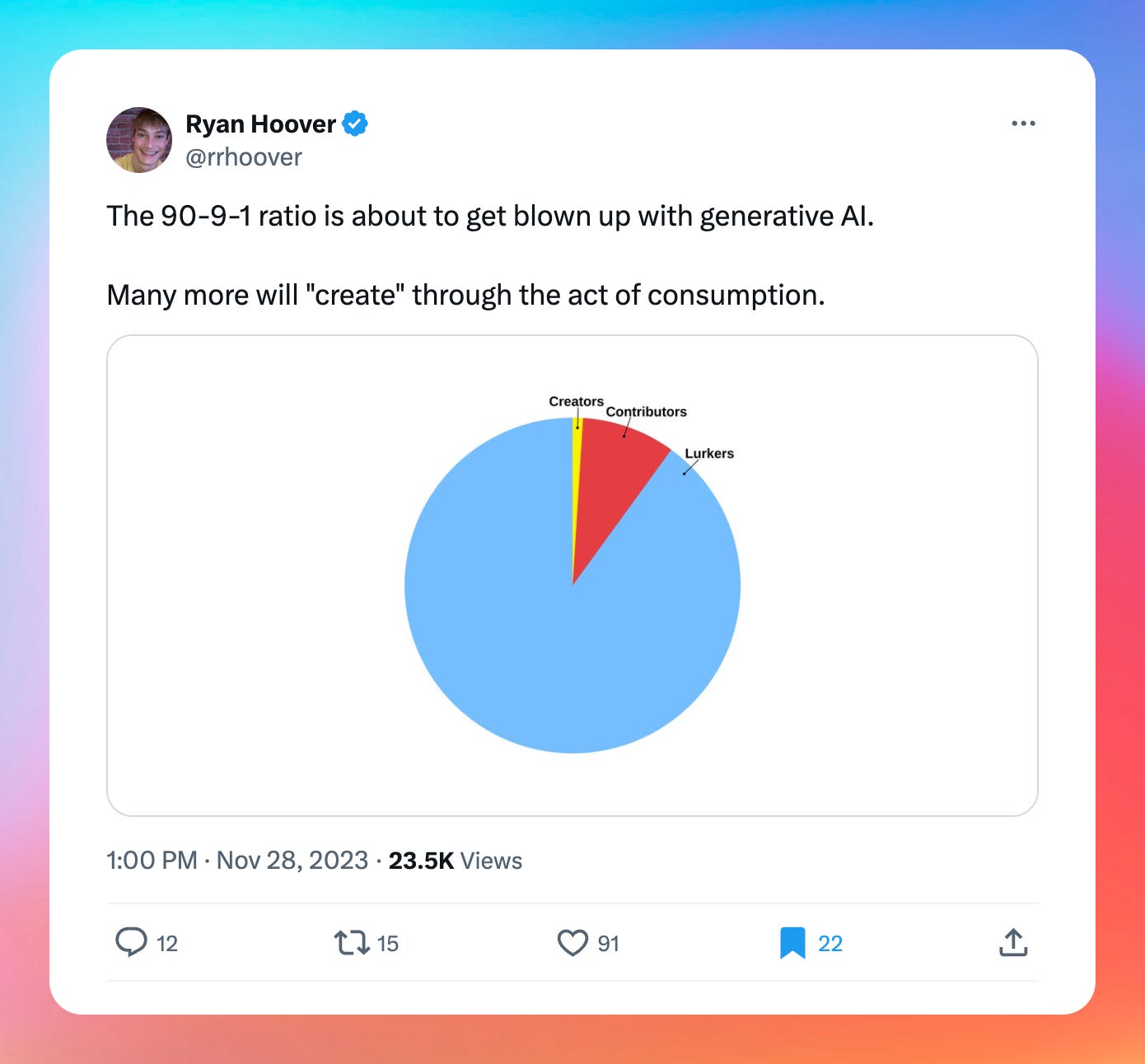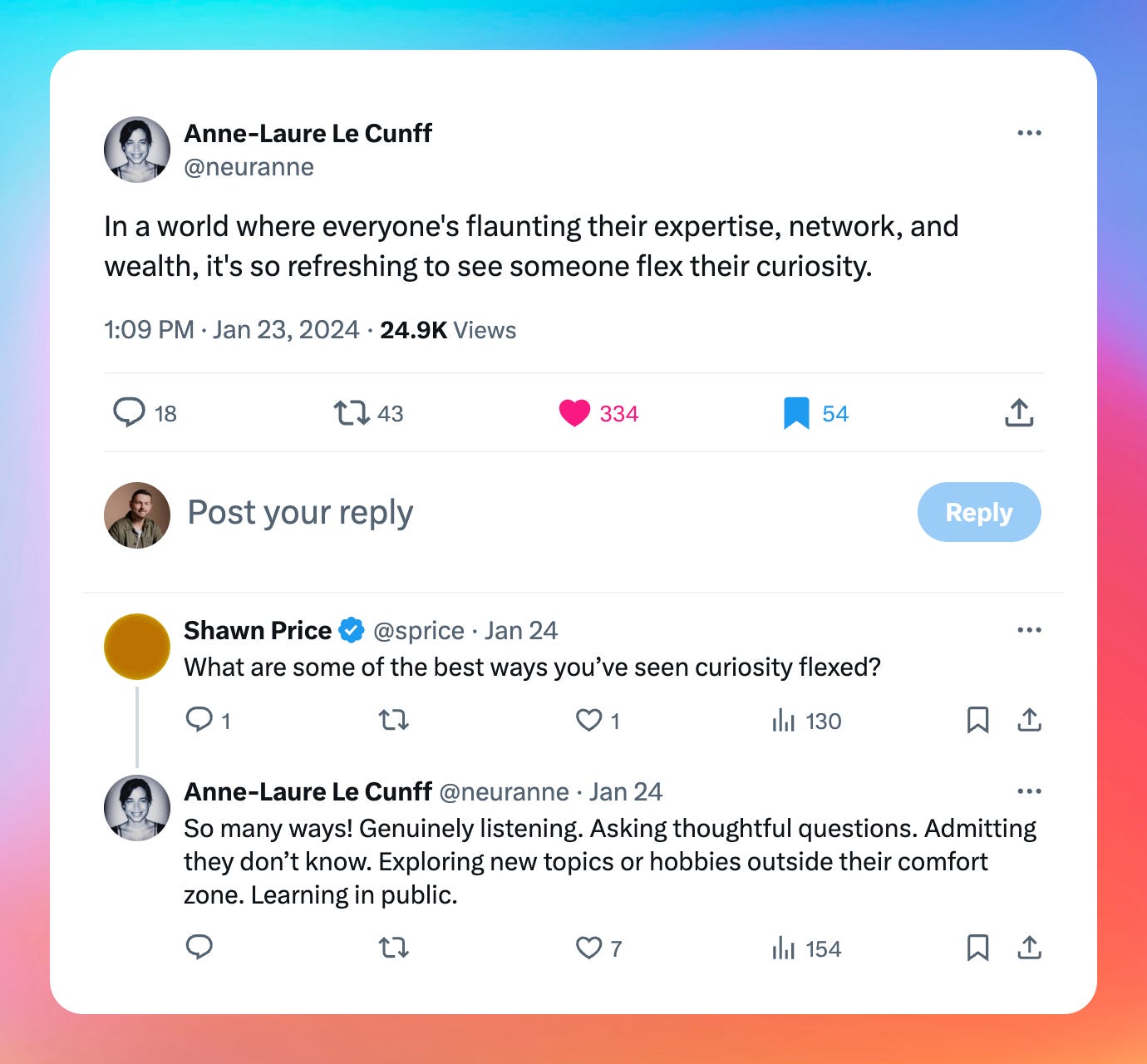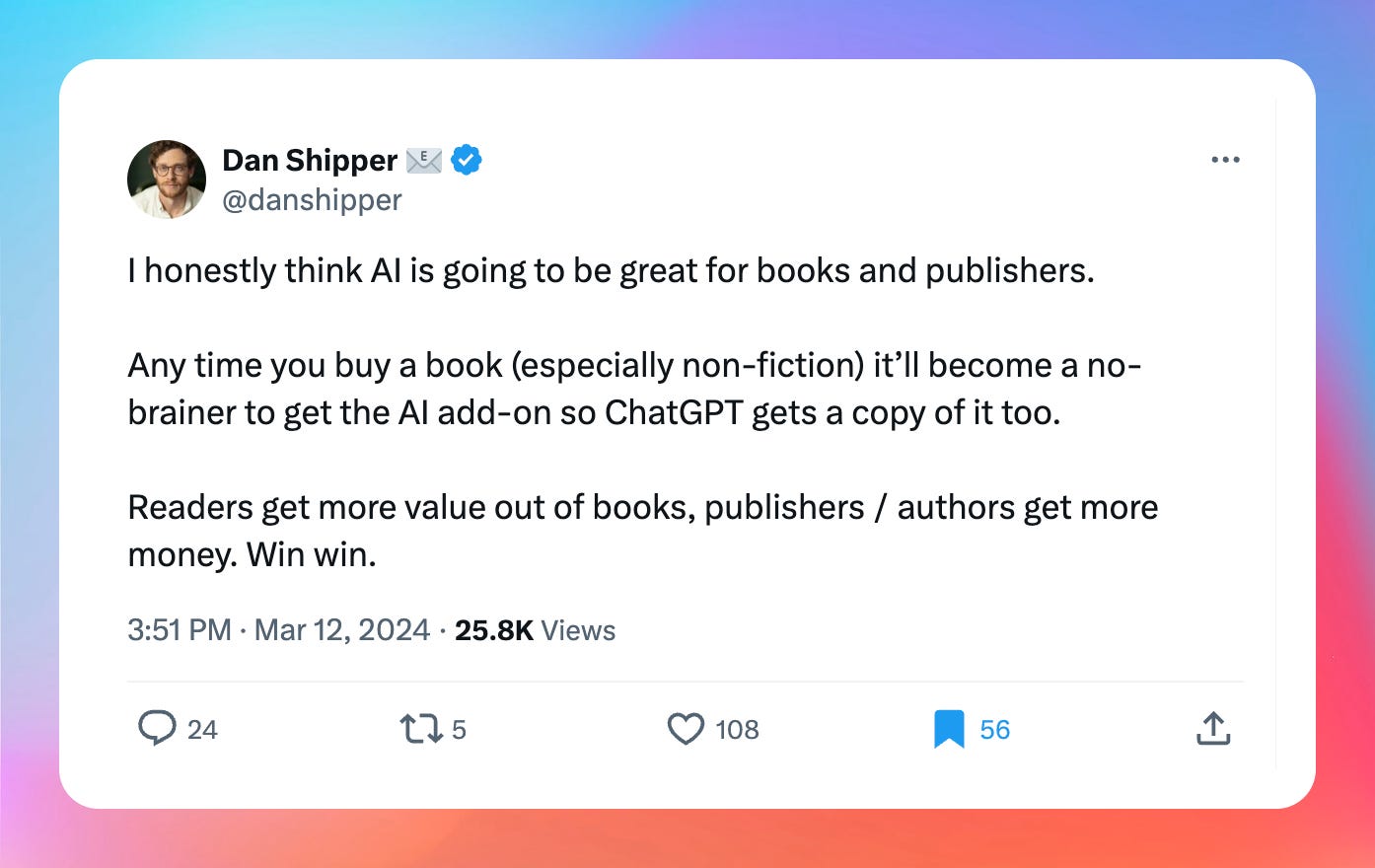A Riff on Thought Leadership in the Age of Generative AI
As an indie consultant, sharing my perspectives on my blog or social media, aka thought leadership, is an essential part of establishing credibility in my niche. But I've been quiet since November. Why the radio silence? As AI tools like ChatGPT continued to improve and our feeds flooded with AI-generated content, I started questioning the value of sharing content online. How can I differentiate myself if we can't tell the difference between human-generated and AI-generated content? Will my audience notice and appreciate the effort I put into my content, or will they think AI just effortlessly generated it? I haven't quite figured it out yet, but a recent conversation with Tom Critchlow and his concept of riffs inspired me to return to my blog. Tom describes a riff as content that “exposes your thinking and deliberately leaves some rough edges, some threads that the reader can pull on, inviting the reader into the conversation.” That's my goal here. Maybe the best way to get out of my writing slump is to share these questions and, hopefully, get perspectives from people smarter than me. The thought leadership trifectaIn typical consulting fashion, I was looking for a framework to explore this topic. So, I turned to an old interview with Seth Godin, where he talked about thought leadership, and I made a quick sketch to illustrate the key ingredients he described. The quote goes like this:
Now that we've isolated some key thought leadership drivers, let's explore how Generative AI could affect each of them. 1. GenerosityIn thought leadership, generosity usually appears in the form of content. Regardless of the medium (a social media post, a blog article, a podcast, a video, a book, or a research paper...), content is often viewed as an act of generosity, in part because of the time, effort, and expertise required to create it. For example, this blog post may only take 5 minutes to read, but behind it are days of reflection, hours of research, and several deleted drafts. Content is hard! That's why most online content is created by a minority of users. According to the 1% rule, only 1% of users are responsible for creating new content, while the remaining 99% are passive. Wikipedia is a prime illustration of this concept. But this dynamic is likely to change with Generative AI. Dylan Field, CEO of Figma, puts it well in this interview: “AI has this opportunity of lowering the floor but raising the ceiling.” This means existing content creators can produce and distribute more work more efficiently while lower barriers to entry invite a wave of new creators into the space. Will content continue to be seen as a generous contribution or a commodity? What new expressions of generosity are likely to emerge over time? 2. TrustAI definitely has its share of trust challenges, from deepfakes to copyright issues. But for now, let's just look at trust in the context of thought leadership. Trust is the belief that the person you rely on will do what is expected. In thought leadership, this means relying on a person or organization to provide ideas and opinions to inspire or support decision-making. Trust is also a function of the options that are available to you. This calls for another gem from Seth Godin:
For a long time, our main option for advice was those closest to us. Then, the Internet revolutionized access to knowledge, opening up a global pool of expertise. Now, hundreds of millions of people have access to super-smart AI assistants! Already, 73% of consumers trust content generated by AI tools, according to a Capgemini Research Institute study. One could argue that AI models are currently unreliable for critical questions and tasks, given their tendency towards hallucinations and biases. But for how long? Anthropic's latest benchmark report states that their most advanced model, Claude 3 Opus, achieves near-human levels of comprehension and fluency on complex tasks, demonstrating a more nuanced understanding of requests. AGI debate aside, it may only be a matter of months before human-generated content is considered inferior and therefore less reliable for many use cases. If we increasingly rely on AI assistants for knowledge and advice, why and when will we still gravitate towards and trust human-generated content? Maybe not for answers, but for what's worth being curious about? This tweet resonated with me, and it's another reason I was drawn to the concept of riffs. 3. AttentionAttention helps us filter the signal from the noise. We all know that attention is scarce and precious. But somehow, we lost control. Online, the algorithms of ad-supported platforms often dictate where we focus our attention. It has turned into a popularity contest, a rush for engagement and monetization, where the most relevant information doesn't necessarily rise to the top. Information overload is probably one of the main reasons for the rapid adoption of AI chatbots. A recent report from Gartner even predicts that by 2026, search engine volume will drop by 25% in favor of AI chatbots and other virtual agents. While the specific percentage may be speculative, it certainly indicates a shift in consumer preferences. The key question for thought leaders is not how to stand out but rather where attention will shift. There are already some interesting examples of creators adding AI add-ons to help users engage with their work. Ethan Mollick is offering exclusive GPTs to help readers interact with his upcoming book and Lenny Rachitsky has his own AI bot trained on his newsletter and podcast content. What choice will you make?When photography emerged in the 19th century, artists had three choices: stick with realistic art, move away from realism, which led to new styles like Impressionism, or integrate photography techniques into their artwork. Generative AI has the potential to disrupt the way people create and consume content. Thought leaders face similar choices: maintain the status quo, reinvent themselves, or integrate these new tools. This article doesn't offer any answers, but I hope it's given you some food for thought. If nothing else, it got me excited about sharing content online again. If you have any thoughts on this topic, please comment here on LinkedIn or book a call with me to explore how this can impact your business. Talk soon, and happy Easter! Erwan Derlyn @Odepar PS: I may have been quiet on my blog lately, but I have published several Miro templates for startup and marketing teams, which were also featured on Miro’s blog. |
Older messages
AI Tools Blur the Line Between Marketing Strategy and Tactics for Startups
Wednesday, November 1, 2023
And How to Use ChatGPT to Make Better Marketing Decisions
PR for startups
Thursday, September 28, 2023
Interview + Workshop with Clara Armand-Delille, Founder & MD @ThirdEyeMedia
A jargon-free go-to-market strategy template
Thursday, February 10, 2022
For startup founders who strongly despise marketing
Startup culture and mental health
Tuesday, January 11, 2022
A conversation with Victoria Trepp, Chief Psychologist at Mindler
A pitch that is music to the ears
Monday, November 15, 2021
What if a hitmaker like Max Martin produced your next pitch deck? That's an odd question I started asking myself after watching the Netflix documentary This is Pop: Stockholm Syndrome and this
You Might Also Like
Animal Shine And Doctor Stein 🐇
Monday, March 3, 2025
And another non-unique app͏ ͏ ͏ ͏ ͏ ͏ ͏ ͏ ͏ ͏ ͏ ͏ ͏ ͏ ͏ ͏ ͏ ͏ ͏ ͏ ͏ ͏ ͏ ͏ ͏ ͏ ͏ ͏ ͏ ͏ ͏ ͏ ͏ ͏ ͏ ͏ ͏ ͏ ͏ ͏ ͏ ͏ ͏ ͏ ͏ ͏ ͏ ͏ ͏ ͏ ͏ ͏ ͏ ͏ ͏ ͏ ͏ ͏
upcoming analyst-led events
Monday, March 3, 2025
the future of the customer journey, tech M&A predictions, and the industrial AI arms race. CB-Insights-Logo-light copy Upcoming analyst-led webinars Highlights: The future of the customer journey,
last call...
Monday, March 3, 2025
are you ready? ͏ ͏ ͏ ͏ ͏ ͏ ͏ ͏ ͏ ͏ ͏ ͏ ͏ ͏ ͏ ͏ ͏ ͏ ͏ ͏ ͏ ͏ ͏ ͏ ͏ ͏ ͏ ͏ ͏ ͏ ͏ ͏ ͏ ͏ ͏ ͏ ͏ ͏ ͏ ͏ ͏ ͏ ͏ ͏ ͏ ͏ ͏ ͏ ͏ ͏ ͏ ͏ ͏ ͏ ͏ ͏ ͏ ͏ ͏ ͏ ͏ ͏ ͏ ͏ ͏ ͏ ͏ ͏ ͏ ͏ ͏ ͏ ͏ ͏ ͏ ͏ ͏ ͏ ͏ ͏ ͏ ͏ ͏ ͏ ͏ ͏ ͏ ͏ ͏ ͏ ͏ ͏ ͏
🦄 Dimmable window technology
Monday, March 3, 2025
Miru is creating windows that uniformly tint—usable in cars, homes, and more.
Lopsided AI Revenues
Monday, March 3, 2025
Tomasz Tunguz Venture Capitalist If you were forwarded this newsletter, and you'd like to receive it in the future, subscribe here. Lopsided AI Revenues Which is the best business in AI at the
📂 NEW: 140 SaaS Marketing Ideas eBook 📕
Monday, March 3, 2025
Most SaaS marketing follows the same playbook. The same channels. The same tactics. The same results. But the biggest wins? They come from smart risks, creative experiments, and ideas you
17 Silicon Valley Startups Raised $633Million - Week of March 3, 2025
Monday, March 3, 2025
🌴 Upfront Summit 2025 Recap 💰 Why Is Warren Buffett Hoarding $300B in Cash 💰 US Crypto Strategic Reserve ⚡ Blackstone / QTS AI Power Strains 🇨🇳 Wan 2.1 - Sora of China ͏ ͏ ͏ ͏ ͏ ͏ ͏ ͏ ͏ ͏ ͏ ͏ ͏ ͏ ͏ ͏ ͏
⛔ STOP paying suppliers upfront - even if they offer a cheaper price in return!
Monday, March 3, 2025
You're not really saving money if all your cash is stuck in inventory. Hey Friend , A lot of ecommerce founders think paying upfront for inventory at a lower price is a smart move. Not always!
13 Content & Media Deals 💰
Monday, March 3, 2025
Follow the money in media ͏ ͏ ͏ ͏ ͏ ͏ ͏ ͏ ͏ ͏ ͏ ͏ ͏ ͏ ͏ ͏ ͏ ͏ ͏ ͏ ͏ ͏ ͏ ͏ ͏ ͏ ͏ ͏ ͏ ͏ ͏ ͏ ͏ ͏ ͏ ͏ ͏ ͏ ͏ ͏ ͏ ͏ ͏ ͏ ͏ ͏ ͏ ͏ ͏ ͏ ͏ ͏ ͏ ͏ ͏ ͏ ͏ ͏ ͏ ͏ ͏ ͏ ͏ ͏ ͏ ͏ ͏ ͏ ͏ ͏ ͏ ͏ ͏ ͏ ͏ ͏ ͏ ͏ ͏ ͏ ͏ ͏ ͏ ͏ ͏ ͏ ͏ ͏
📂 EXACTLY how Teachable got the first $1M ARR
Monday, March 3, 2025
Here's what the founder of Teachable, Ankur Nagpal, said about growing Teachable to their first $1M in ARR. Later, they'd sell for $250M! Fall 2013 I was 24 years old and had just moved




